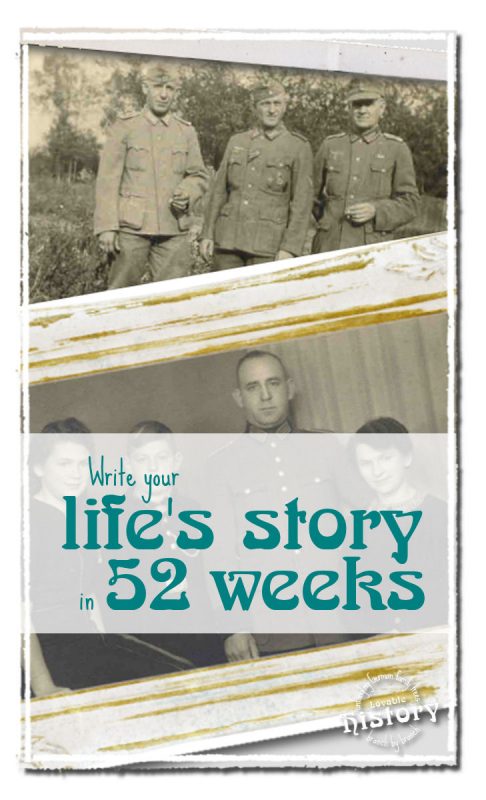This article is part of the series “Put down your life’s story in 52 weeks” in which I accepted the challenge of writing down snippets of my own life’s story in 52 weeks.
![]()
![Write your life story in 52 weeks. [www.lovablehistory.com]](http://www.lovablehistory.com/wp-content/uploads/2017/04/lovable-history-life-story-in-52-weeks-K-b.jpg)
Questions 44-47
- What were some of the jobs you had throughout your life? Explain some of the memorable experiences you had with these jobs.
- What are 5 significant events or experiences in your life, and explain what effects they have had on you.
- What are some of the life lessons that you have learned and would like to pass on to your descendants?
- In how many places have you lived during your lifetime? Provide a brief description of each place you’ve lived, why you lived there, and why you moved.
The Times They Are A-Changin’
In former centuries a middle-class or peasant person’s place of birth had more influence on their life than it is nowadays. They often picked a profession that was available in their area, or simply grew into it, learning from their father or (usually) male relatives. They married partners from the same area, often took over their parents’ farm or (work-)shop, raised their children in the same place where they grew up and finally died there as well. Most of this was based on the feudal system that was in place back then. The farmers weren’t really free to chose.
Agrarian reform
All that changed step by step during the first half of the 19th century when an agrarian reform brought the so-called Liberation of the serfs. They now were allowed to buy the formerly leased farms for a steep price, often for the 25-fold amount of the annual rent. Yes, if they managed that, they owned the farm land. But no, it didn’t really become easier for them.
The result of that liberation very often was a long-term debt for the farmers or even a social descent from farmers to day labourers. If they managed to buy their way out of the dependency the family used to stay in that area just like before. But that also was the time when many people decided to emigrate to North and South America, Australia, New Zealand and other countries.
But the people didn’t only emigrate to other countries, they also migrated within the German speaking countries which hadn’t been unified yet. A lot of them had to leave their native area in order to find work. Several branches of trade became redundant. Like the linen weavers in my family who usually had their workshop at home. Their way of producing linen fabrics became less profitable over time. The industrial linen weaving mills were quicker and cheaper. So the linen weavers very often had to leave their native area and move closer to where linen weaving mills were.
Nowadays…
… young people already leave home to attend college or for an apprenticeship. After that they don’t have a guarantee that they’ll find a job close to home or close to their college, so they often have to move again. And even then it might be necessary for them to look for a new home whenever they switch employers. Very different from two hundred years ago, isn’t it?
![]()
My first home
My parents married a few years after WW II and shared an apartment with my grandma because available free living quarters still were still few and far between. That changed when I was on my way into this world. My father found a new job and was offered an apartment in a Wilhelminian style house, owned by his employer: a small hall, a big kitchen, living room and one bedroom, each room 3.5 meter high (approx. 3.8 yards). The water closet was in the hallway, shared by three families… Bathing time included hauling up a zinc tub from the basement and heating lots of water in a kettle on the stove.
![Write your life story in 52 weeks. [www.lovablehistory.com]](http://www.lovablehistory.com/wp-content/uploads/2017/10/lovable-history-life-story-in-52-weeks-K-home2-b.jpg)
After a few years the small two-room apartment right next to my parents’ apartment was divided. The smaller room became a furnished apartment for a single person, the bigger room became our new living room. The old living room became a decently sized children’s room.
And again a few years later the furnished apartment became part of our apartment as the new kitchen. The old kitchen became a bath, complete with an enamelled tub and warm water from the tab, yay! No more hauling up the zinc tub (I already was too big for that one anyway). And finally room for a washing machine! Until then it had been the sink or the tub – or the “laundry room” in the basement of a rear building, dank, humid, soggy, clammy, with a big laundry sink made of stone, just eeeew… The “laundry room” was accessible only from the outside over narrow, slimy, mossy brick stairs leading down from the narrow backyard.
The backyard was a narrow piece to the north of our house. Most of the time it was “shady” on three sides: the house to the south, the rear building to the east and a brick wall to the west. It must’ve been a garden once, since there still were barely visible flower bed edgings and an overgrown brick path. And spiders, lots of spiders, tons of spiders! In the late afternoon the sun had a chance to peek into the backyard so we played there sometimes. Other than that it was just there to peg out washing – no chance for us kids to enter the backyard during that time.
![]()
Moving for the first time
And then the landlord raised the rent – way more than my parents were willing (and able) to pay. So that meant looking for a new home. My parents worked hard and spent their money on an own small apartment instead of someone else’s. Yes, it meant downsizing quite a bit. Actually I wouldn’t have minded a much smaller room than before. An own room though, not having to share with my younger brother. But alas, the room was much smaller than the one we had before – and we still had to share.
The house had been built in the early 70’s and had room for 24 families. Not a really pretty building but to me the outside rarely matters. An own balcony on the sunny southern side! An own room for bikes!! And two shopping centers not too far off…
On a sidenote, since I didn’t care much back in those days: There was a big laundry room in the basement, airy and light. An own room with washing machines and dryers, to use with coins. The dryers made life easier for my mother at least.
![Write your life story in 52 weeks. [www.lovablehistory.com]](http://www.lovablehistory.com/wp-content/uploads/2017/10/lovable-history-life-story-in-52-weeks-K-home3-b.jpg)
![]()
Moving out
When I married I moved from the Rhineland to Westfalia. Our first home was a small roof-top apartment with lots of sloped ceilings. I had to get used to that. The landlord lived on the first floor, we were on the second. We didn’t stay there for long though, our landlady was overly curious. I noticed more than once that she had been “inspecting” our apartment while we were at work. How the heck…!? When I became pregnant for the first time we looked for a bigger apartment – without an extremely nosy landlady.
(I need to find a picture of that house, though I might have to go and take a new one. I’m not sure if we even have a picture of it somewhere.)
![]()
Growing the family
Our new apartment was big enough to stay there for a few years. It was no palace but it was good enough for a family with three kids. We even had our own patio for our children to play on. The other apartments only had a smaller balcony. That house also had been built in the 70’s and offered a small sunlit garden behind the house and a playground nearby. There were many families with kids in this area, many of which later attended the same kindergarten and the same school as my kids. So all was well for several years.
(We DO have a picture of at least the house entry somewhere but I have to find it first.)
![]()
Building our own house
But things became a bit cramped when my three kids became to big(ger) brothers and sister again. My parents-in-law weren’t the youngest any more. They offered to give up their kitchen garden for us to build a house on. Which we did. Daddy would build the house with a little help from our friends – and family. Grandpa (who had been a carpenter) would take care of the windows, staircase, railings and almost everything made of wood except for the roof framework. Grandma would do what she could do best: cooking and baking for the people.
And at noon I would pick up the kids from kindergarten and school in the village where we lived at that time and drive over to Grandpa and Grandma. The kids would play in the garden behind the new house (or pester Daddy – or both). I then usually paid a visit or two (or more) to almost every hardware store for electric cables, insulating material or tons of mortar – or visited the architect to have him countersign the bills so I could pay them – or I visited the roofer or the tiler to check on details – or drove Grandpa to his nephew’s workshop to help him paint the window frames or the wooden steps of our staircase which he made for us.
Moving in
After almost 18 months (after we first talked to the architect) we finally moved in. Lots to do still, but it was our own house with enough room for all of us. My father joined us four days a week for the next year to take care of all the small stuff and many details that needed to be done still – and to enjoy the presence of his grandchildren.
Grandma’s former kitchen garden mainly became a playground for the toddlers, a soccer field for the bigger kids and later a party ground for the teenagers. Plenty of room for four resp. later five kids, several cats, one dog, plenty of trees and berry bushes. And for Daddy’s father (Grandpa) sneaking up to the gooseberries and plums to raid them, and to look very surprised if his blood sugar was over the top again… ooops…
![Write your life story in 52 weeks. [www.lovablehistory.com]](http://www.lovablehistory.com/wp-content/uploads/2017/10/lovable-history-life-story-in-52-weeks-K-home6-b.jpg)
But by now most of the kids have left the nest, so to speak. Most already left years ago when they finished school and started an apprenticeship or went to college. They now are building their own lives, getting their own families. Waaaay too much room in our house for my liking. But we’ll see what the future holds for us.
I remember that a friend’s mother used to move to a new place every two or three years, just because… When my friend’s sister was about 40 years old she groaned about her mother moving again: “Can’t she stay in her apartment for a few more years? Does she have to move yet again?! I’m getting too old for this sh…!” Mind you, it was my friend’s sister who said that, not her mother, 30 years her senior…
Did you ever move to a new place without having to for financial or work-related reasons or because your family outgrew your old place?


Leave a Reply